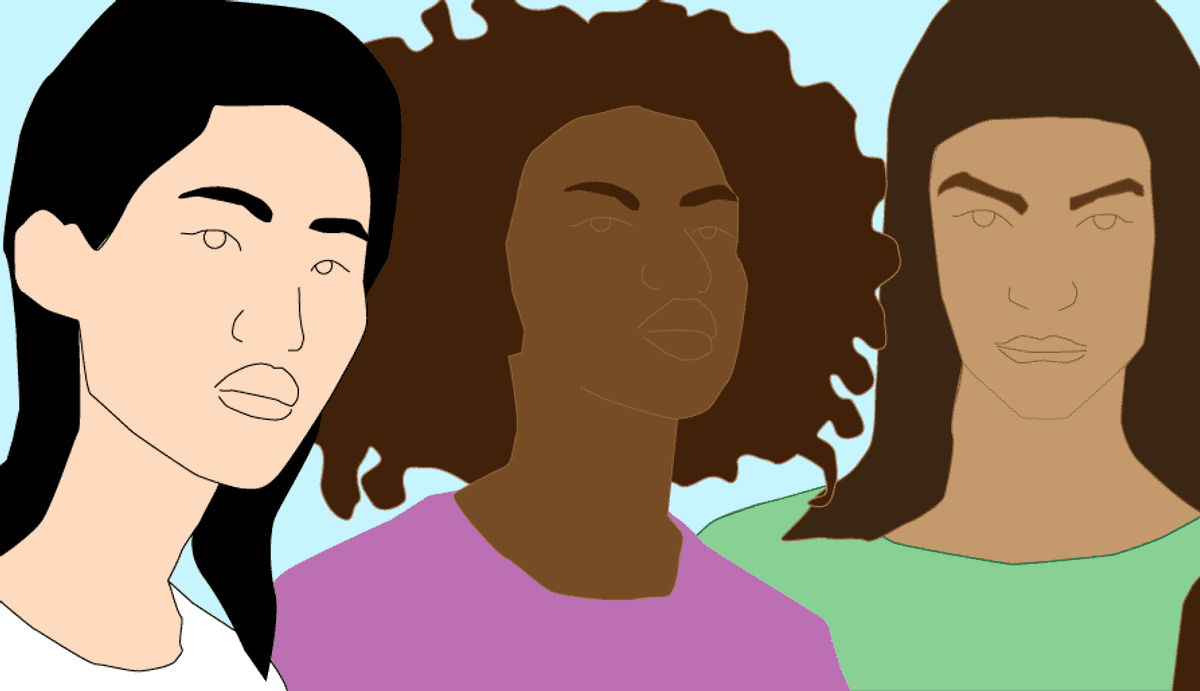Inside Thai Sookdee, a cozy Evanston restaurant, a group of about 12 students, including Elizabeth, animatedly talked about Selma, the film they had just seen for class. Discussion of the film eventually meandered to the topic of names. Elizabeth answered the usual questions about her birth name: “Where does it come from?” and “Where are your parents from?” She didn’t mind those too much, but a comment from one of the girls in the group caught her off guard. “Why don’t you just, like, go by your regular name?” she asked. The freshman explained that her Nigerian first name was hard for people to pronounce and that they often tripped up on some of the letters. “I don’t know, you’re not really commanding respect if you’re letting people control your name,” replied the girl. Elizabeth had no clue how to respond to the condescending remark, especially coming from a typical white American girl, whom she barely knew. She was so surprised that she could only manage an uneasy “Okay…?” Earlier that evening, Elizabeth had left the theater feeling solemn but inspired by Martin Luther King Jr.’s activism and the film’s message of resistance. But what she felt then, on that cold winter night in 2015, was the familiar shame she had experienced growing up.
***
The name Ayomide (EYE-YO-ME-DAY) means “my joy has come” in Yoruba. Given that it’s common in parts of Nigeria to give children names representing a family member’s life experience, her parents felt it fit to name her Ayomide as a way to mark the good fortune of her birth despite concerns about her mother’s health during pregnancy. However, Elizabeth would find that San Antonio, Texas, where she attended middle school, wasn’t the best place to celebrate her unique heritage. She says it wasn’t uncommon to catch sight of Confederate flags, and in her history class, she learned the Civil War was about states’ rights, not slavery. At her high school in Dayton, Ohio, out of the roughly 200 people in her graduating class, only about six were black. Her friend group was reflective of those demographics, with Elizabeth being the only black person. She grew up in a sea of Joshs, Lindseys and Matts. Being Nigerian, being black, being named Ayomide, or anything not found in typical white America just wasn’t something that people were proud of in her neighborhood. In high school, she decided to go by Elizabeth, the Christian name of both her grandmothers. She says it was a no-brainer at the time. She was sick of having to explain her name when none of her other classmates ever had to, and sick of hearing it mispronounced. She chose to keep going by Elizabeth when she went to Northwestern University. Her parents thought she was ashamed of her special name, and by extension, her Nigerian roots. And although Elizabeth had her reasons for changing her first name, guilt and uncertainty plagued her in high school, and followed her to college. It was those same feelings that returned to her as the random girl asked why she didn’t go by her ‘regular’ name. She couldn’t stop asking herself questions : “Should I have said more?” “When other people learn my real name, do they also judge me for not using it?” “Am I disrespecting my parents or my heritage?”
***
Historically, people of all origins have changed their names for a variety of reasons. Some just don’t like the way it sounds. For others, such as immigrants moving to the United States in the nineteenth and twentieth centuries, there were advantages to de-emphasising certain surnames, so that Steinweg would become Steinway, and Anna Maria Louisa Italiano would become Anne Bancroft. A 2010 New York Times article claimed immigrants in the U.S. aren’t changing their names as much now, which is perhaps an optimistic generalization. President Trump’s exclusionary politics, in the form of travel bans and border walls, has encouraged an increase of openly xenophobic and anti-immigrant sentiments across the country. It would not be a stretch to suggest that it has caused many to feel unsafe and to perhaps consider the option of de-emphasising their visibly ethnic names in the same manner that immigrants from previous generations have done. Alongside these issues, university students, like Elizabeth, face an additional challenge when it comes to their names. To abandon their ‘ethnic’ birth names is perceived by many as abandoning cultures and heritage. But it is a risk that many are, understandably, willing to take, since studies have shown that using their birth names could hurt their marketability and hiring chances after graduation. Professor Onnie Rogers, a developmental psychologist at Northwestern whose research deals with racially diverse youth and social groups, noted: “We still live in a very racist society: We live in a context in which stereotypes and expectations are made about people based on what they look like, what they sound like, the names that they have … That’s an additional burden on people of color and immigrants, [when it comes] to determin[ing] how to balance their own identity and resistance to being assimilated to a particular kind of American[ness].”
***
Even though she knows that her university is far from perfect, Elizabeth says Northwestern is more diverse than the schools she attended before. Here, she’s found other people from Nigeria, other countries in Africa and all over the world. She’s learned about Black Lives Matter, and her African American Studies classes have influenced the way she thinks about race, and have allowed her to feel comfortable enough to talk about it. Likewise, going to Northwestern was a turning point for junior Nicole Regalado, whose full name was Keyko (KAY-KO) Nicole Regalado Bernal. Born in Peru, Nicole moved to America when she was eight. Although her family and friends still called her Nicole, she says she felt so embarrassed about correcting people that she let people at school call her Keyko. This continued all the way up to high school. When she got to Northwestern, she decided to just go by Nicole and to use her paternal last name, Regalado. Unlike Elizabeth, Nicole’s legal Japanese first name Keyko didn’t have cultural or emotional significance. Her dad just happened to like the name, which belonged to the daughter of the Japanese-Peruvian president at the time. She says her decision to legally change her name to Nicole Regalado when she received U.S. citizenship was in part borne out of practicality. Her lengthy name had caused many annoyances throughout her life: Scantron sheets at school and resumes could never fit her full name; at CVS, the pharmacist once couldn’t find her prescription because her last names weren’t listed properly; and her Northwestern email address was long and tedious to type. Her goodbye to Keyko wasn’t a particularly sentimental one. Rather, Nicole says it was a necessary goodbye to a past self that allowed to people dictate her choices. “A lot of the time in school … I felt like I didn’t want to bother teachers by correcting them,” she says. “I was too shy to tell them that that I’d rather go by my middle name, and this is just a way for me to let go of that shyness.”
***
For Hayeon Kim (HA-YUN), a Korean American who majored in Asian American Studies and American Studies, coming to Northwestern was also about letting go, and in her case it was of “internalized racism.” Going to a predominantly Asian-American high school, adopting typically English sounding names was the norm for many people going to college. Hayeon, who recently graduated, felt obligated to conform to this idea that non-Asian sounding names led to easier acceptance. She began to introduce herself as Norah during the Wildcat Welcome freshman orientation period. As a freshman, she also felt pressured to put herself “in the whitest spaces on campus” and to avoid befriending other Asians. Throughout her freshman year certain events led Hayeon to reconsider her choice in name change. In the fall, she says she took an Asian American Studies film class that opened her eyes to issues of ethnicity and race. Then, during spring quarter, when she was considering applying for U.S. citizenship (at the time she was a Korean citizen) she struggled with deciding on the name she wanted to have on her official documents. She was forced to reflect even further on the matter when asked in the an application form for her American Studies major to define what Americanness meant to her. Finally, one night in the spring quarter of her freshman year, she logged onto Facebook and announced in a post that she was going back to Hayeon. “Throughout my life … my ethnicity has been very fragile in the way that I feel it,” says Hayeon, who moved to the U.S. from Korea when she was just 6 years old. “Just because you’re Korean doesn’t mean you need to be fluent in the language … but in practice, it’s actually very important. So for me, I do always have a constant longing to learn more, be better, more fluent and more versed in the Korean culture and language.” Returning to Hayeon was her way of maintaining a tie to her heritage while at the same time reminding herself that there isn’t one definitive ‘American name.’ “Part of me changing back to my Korean name in my American passport was to normalize that idea that you don’t have to have a traditional American name to be a citizen,” Hayeon says. “I think I’ve conflated U.S. citizenship with Americanness. Those two are very mutually exclusive, but I think for me I wanted that on paper: my original name.”
***
Jee Young Lee, a rising senior journalism student also from South Korea, says she’s unsure if she will continue to use her birth name, since she feels an anglicized name might serve her better. In the campus publication she writes for, her byline shows her English name, because she didn’t want to ask for special treatment or make editors uncomfortable. This January, at the Medill Career Fair at Norris University Center, when she walked up to recruiters from Apple and AOL/Huffington Post, she made a conscious decision to introduce herself as Jenna. She was sporting a white sweater and black jeans, an ensemble slightly more relaxed than the ‘business casual’ attire career fairs usually require. But this was all part of her plan to make interactions as natural as possible. Sure, this may be everybody’s plan when attempting to woo recruiters, but her motives slightly differed from those of the average job-seeking Northwestern student. “I feel definitely more foreign if I just go by my Korean name,” Jee Young says. “I don’t want to reveal my status as international … I don’t want that initial difference to be there, to even more differentiate myself from others.” When going on job interviews, she says she feels that employers can immediately discern her outsider status, just by the way she holds herself. She worries that being an international student can hurt her chances of getting hired, because she wouldn’t be able to fit into company environments without being knowledgeable about American customs and pop culture. If Jee Young seems like she’s thinking about marketability too much, it’s because she has to. On top of the normal pressures American citizens or permanent residents face when applying for jobs, she has to deal with another burden: as an international student participating in the Optional Practical Training (OPT) program under the F-1 visa, she only has one year after graduation to find a job in the U.S.. If she fails, she has to return to Korea, where she says the number of available jobs and quality of journalism pale in comparison to those in America. With that in mind, maybe Jee Young doesn’t have time to think about abstract ideas such as identity and embracing one’s ‘regular name’ — she needs to focus on practical goals such as staying in the U.S.. “I see so many wonderful opportunities that I want to explore, but I feel like that fear, that thought that, ‘Oh, I’ll probably never get there,’ kind of sucks,” she admits. “That thought holds me back. That’s a lot to grapple with.” Her fears aren’t unfounded; there is evidence suggesting that callback rates for resumes can depend on how ‘ethnic’ a name sounds, which Elizabeth and Hayeon both cited as reasons for wanting anglicized names. In 2003, researchers from the University of Chicago and MIT found that white names like ‘Emily’ and ‘Greg’ got “50 percent more callbacks for interviews” than black-sounding names such as ‘Lakisha’ and ‘Jamal.’ In a 2014 BuzzFeed video, José Zamora said that after he dropped the ‘s’ from his first name in resumes, becoming ‘Joe,’ he went from getting no responses to having a full inbox a week later. And just this year, according to NPR, Canadian academics reported that job applicants with names of Chinese, Indian or Pakistani origin were 28 percent less likely to get an interview compared to applicants with the same qualifications but who had Anglo-European-sounding names. The same article mentioned that in 2009, Texas state representative Betty Brown actually recommended that Chinese Americans adopt new names that “we could deal with more readily here.” Even though she hasn’t experienced it herself, Nicole says other Latinx students at Northwestern have told her they felt discriminated against in the workplace because of their first or last name. She says hearing these students’ stories affected how she viewed her own name in professional settings. “Due to our political climate at the moment, I do feel that me changing my name might have been for the better,” Nicole says. “It doesn’t feel right to say that at all, trust me — no one should be discriminated against because of their name … But I do honestly believe that as long as the climate is what it is, that my name, because it’s so Americanized now … will help me out.”
***
For Nicole, growing up included taking control of her name. For Hayeon, it meant defining Americanness for herself. For Elizabeth, it entailed becoming more curious and asking questions about her parents’ lives and culture. She learned to appreciate that her parents’ overcame racism and other roadblocks when they came to America, all so that she and her sisters could have the privilege of being born in this country. In high school, she started eating the Nigerian food her parents cooked, and even began listening to Nigerian music. All of these efforts have made her proud of not only her name, but where it came from. Elizabeth says that she feels that everything to do with “the political climate and the election just made me feel like I should be more proud … [of] my name and myself. For me [with my name], it’d just be an embarrassment, but there are people for whom being open about their culture or their background is unsafe and they’re not sure if they’ll be attacked, verbally or physically or physically for it … So I feel it’s important to not shy away from that.”
***
Elizabeth, now a rising senior, has certainly come a long way since her Dayton days, and even since her Thai Sookdee encounter. She says that her growing appreciation for her Nigerian heritage has made her unsure about whether to keep using Elizabeth, or to return to Ayomide. There are pros and cons for each choice: Maybe people like Jee Young and Elizabeth should embrace their ‘weird’ or ‘ethnic’ names like Hayeon did as a way to celebrate their cultures and defy xenophobia. Perhaps it wouldn’t actually hurt their marketability — Jee Young even says that most people respond positively to her name and think it’s unique. But on the other hand, Americanized names could help them professionally, and release them from pesky, judgmental questions and the need to repeatedly explain their names. For people such as Nicole, especially, a name might just be a name. Changing it (or keeping it) doesn’t have to be a big deal or signify being ashamed of one’s culture. Professor Rogers says there’s no one answer to the name quandary. What it comes down to, she adds, is if individuals can separate themselves from a strategy and not buy into it. It’s one thing to go by Jenna to increase one’s chances of professional success, it’s another to actually believe Western names such as Jenna or Elizabeth are superior to Jee Young or Ayomide. People must reflect on their motivations and contexts for adopting another name, because if they’re using it as a way to hide their difference and past, it can have negative consequences in the long run. “You’re essentially … like, ‘I don’t want to talk about this [aspect] about me, I don’t want anyone to know about this,’” Rogers says. “So you suppress a piece of who you are in order to fit into a culture or a society, and that sort of self-denial or repression is problematic for our well-being, for our sense of authentic belonging.” Like Jee Young says, all of this is a lot to grapple with.
***
And oh, what was the name of that random white girl? As Elizabeth remembers, it was something on par with ‘Sarah.’ “Of course, her name was the easiest name in the world,” she says dryly. “[She] couldn’t possibly understand what it’s like.” *Elizabeth’s surname has been taken out of the piece for personal reasons




